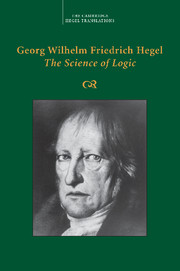Chapter 2 - The Idea of Cognition
Published online by Cambridge University Press: 30 September 2021
Summary
Life is the immediate idea, or the idea as its still internally unrealized concept. In its judgment, the idea is cognition in general.
The concept is for itself as concept inasmuch as it freely and concretely exists as abstract universality or a genus. As such, it is its pure self-identity that internally differentiates itself in such a way that the differentiated is not an objectivity but is rather equally liberated into subjectivity or into the form of simple self-equality; consequently, the object facing the concept is the concept itself. Its reality in general is the form of its existence; all depends on the determination of this form; on it rests the difference between what the concept is in itself, or as subjective, and what it is when immersed in objectivity, and then in the idea of life. In this last, the concept is indeed distinguished from its external reality and posited for itself; however, this being-for-itself which it nowhas, it has only as an identity that refers to itself as immersed in the objectivity subjugated to it, or to itself as indwelling, substantial form. The elevation of the concept above life consists in this, that its reality is the concept-form liberated into universality. Through this judgment the idea is doubled, into the subjective concept whose reality is the concept itself, and the objective concept which is as life. – Thought, spirit, self-consciousness, are determinations of the idea inasmuch as the latter has itself as the subject matter, and its existence, that is, the determinateness of its being, is its own difference from itself.
The metaphysics of the spirit or, as was more commonly said in the past, of the soul, revolved around the determinations of substance, simplicity, immateriality. These were determinations for which spirit was supposed to be the ground, but as a subject drawn from empirical consciousness, and the question then was which predicates agreed with the perceived facts. But this was a procedure that could go no further than the procedure of physics, which reduces the world of appearance to general laws and determinations of reflection, for it is spirit still as phenomenal that is taken as the foundation.
- Type
- Chapter
- Information
- Georg Wilhelm Friedrich Hegel: The Science of Logic , pp. 689 - 734Publisher: Cambridge University PressPrint publication year: 2010

